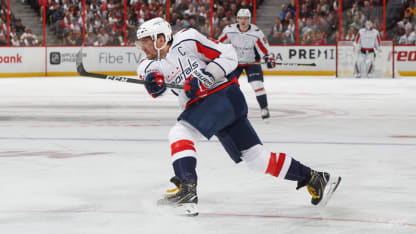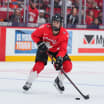Ovechkin has averaged 47.93 goals during any selected stretch of 78 regular-season games, from a minimum of 29 to a maximum of 65. Based on standard deviation of 9.29 goals, there is a 17.6 percent chance that randomly selecting any 78 games from his career would include at least 57 goals, which is a little better than one in six.
Given that Ovechkin is 32 years old, his odds of scoring 57 goals in 78 games are probably lower than that estimate. It's commonly accepted that goal-scoring rates start to drop around the age-31 season. Since 1975-76, the only player to score 50 goals in a season at age 32 or older is Jaromir Jagr, who, at 33, scored 54 goals in 82 games for the New York Rangers in 2005-06. Since then, Jagr, now with the Calgary Flames, hasn't scored more than 30 in a season.
On average, a forward's goal-scoring rate falls by 11.4 percent going from age 31 to 32, due to a combination of declining speed and decreasing ice time, especially on the top lines or on the power play.
Every individual player is different, and Ovechkin could be one of those players who will decline at a slower rate and/or at a more advanced age. Last season, he scored 33 goals in 82 games, a season-to-season decline of 34 percent. However, that was his first decline greater than 4 percent since the 2010-11 season, when he went from 50 goals to 32.
If he does beat the odds and scores 65 goals this season, that puts Ovechkin back in the conversation about equaling Gretzky's 894 goals. A 65-goal season would bring Ovechkin to 623, which is within 271 of Gretzky.


















